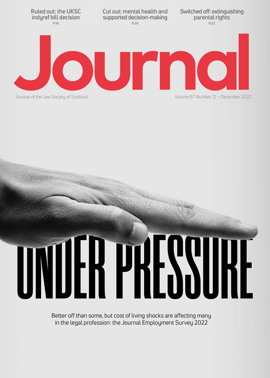Tradecraft tips

That awful sinking feeling – 1
Even the most successful football team is not expected to win every single match they play, but solicitors have to get what they do 100% right, 100% of the time. That is the standard we are held to. In my experience it takes only a comparatively minor mistake to cast a shadow over all the other things you have done correctly. This to my mind is the downside of legal work.
It is a curious phenomenon that when you make a blunder, more often than not you realise it before anyone else does, and I have made one or two mistakes that nobody has ever twigged to. In such a case you have time to work out how to deal with the situation and do whatever research is necessary. One thing you learn in the law is how to worry economically, and not to fret or worry far beyond what the problem actually merits.
The number one priority is not to cover up the mistake or go into denial if that will prejudice the client’s position. After all, we all have to subscribe to the Master Policy, which is what allows us to get to sleep at night, and unlike the medical profession our mistakes can usually be equated to a sum of money to restore the clients to the position they would have been in if the mistake had not been made in the first place.
What I call “shadowing” a mistake is a technique which it is difficult to teach other people, but what you need to do is work out what solutions are available and what the pluses and minuses are for each possible course of action. If you have to disclose the error to the client, you will need to be able to explain what can be done about it and confirm to the client that they will not have to suffer a financial loss because of it. Prior to doing this, however, you should speak to the client relations partner, first of all to get a second opinion on how to deal with the error but also because certain procedures may need to be followed if
the mistake might result in a claim on the Master Policy.
What you do not do under any circumstances is tell the client that a mistake has been made and leave them without any sort of guidance as to what can be done about it and what the consequences for them may be. The client may not have the ability to assess the extent and importance of the mistake. You have to do this for them.
That awful sinking feeling – 2
Commenting on being in command of troops, the late Field Marshal Montgomery said that you will make mistakes, but if you get 51% of your decisions right you will get through. Solicitors however cannot operate on a 51%/49% basis.
A number of years ago I was reading a report from the Discipline Tribunal about a solicitor who had run into problems with a conveyancing matter. A sentence in the report just made me shudder: “She received no support from the other partners.”
No matter how careful you are, you will make mistakes. If another solicitor in your firm asks for your assistance in dealing with a difficult situation or a mistake, do not give them the red card. Do whatever you can to help them. Who is to say that it is not going to be your turn next to make an error, and you might appreciate a bit of help and support in dealing with it.
Risky business
Some years ago clients were selling a shop. The purchaser wanted to leave part of the price outstanding and secured by a standard security. I had considerable misgivings about this proposal, but the clients were focused solely on the fact that they were getting a very good price for their shop.
My concerns were annoying the clients. They confronted me and said: “You don’t want this deal to go ahead.” When I explained the risks involved, they said: “But you have got insurance”, meaning the Master Policy. The clients did not appreciate that this was to cover them against us making an error which would cost them money. It was not intended to cover clients taking a known risk and ending up losing out if the worst came to the worst.
The balance of the price was eventually paid, but the purchaser went bankrupt a little while later. The clients were just lucky here. In such situations where there is a higher than average chance of something going wrong, you really need to have something in writing spelling out the risks which the clients are taking, so that it is obvious to anyone looking at the file that the clients went forward with their eyes wide open and fully aware of the risks. Telephone calls or notes of meeting have a lesser value here. It really has to be an email or letter.
Wayward clients – 1
Clients who don’t reply to correspondence can be particularly difficult to deal with, and the longer the list of questions you give them the greater their reluctance to engage with you. I rather suspect that this results from people finding it more convenient to speak on the telephone rather than sit at a keyboard or put pen to paper. Communicating by email is a wonderful thing for me, as I have a considerable dislike of phoning clients out of the blue, but where I am getting no response to my emails there is no alternative to phoning them and following this up with a detailed note for the file.
The stage might also be reached where you have to say to the client in so many words that their prompt response to emails is essential for you to give them the best service. This also covers you if the file falls under review by the authorities.
Wayward clients – 2
Something which adds an unwelcome level of complication to matters is when you discover that your client is in direct touch with the client on the other side. This may put you in a position where you are reluctant to be forthcoming with your client for fear that what you say will be passed on and eventually reach the solicitor on the other side. I do not consider that I can go as far as telling my clients not to communicate with the parties on the other side, but anything sensitive which I say to them has to be prefaced by saying “Strictly between ourselves…”
On the other hand, if your clients are in touch direct with the other parties it can sometimes be to your advantage. In one of my cases the other solicitor was threatening to raise a court action at the very same moment that his clients were emailing my clients virtually conceding the point at issue. I simply did not have the heart to tell the other solicitor what had happened.
Solicitors or spectators
It irritates me when I detect laziness or a lack of imagination in the solicitor on the other side of a transaction. I think to myself: “If I was on your side of this matter I would be applying more resources to make sure that the client ended up with something positive rather than a deal which falls apart.” I get the impression that they are simply watching what is happening rather than trying to make something happen, and they are more of a spectator in parts of the legal process rather than someone who should be acting on behalf of their client.
We have to take our clients’ instructions, but we do have a bit of leeway nevertheless. I would never compose a two page draft qualified acceptance and then email it to the client for their comments. Their eyes would probably glaze over after reading the first few sentences. My job is to pick out what is important and present it to the client in plain English and ask them either to provide the information needed or to make the necessary decisions. Presenting missives to the clients in their pure form might prompt the response “Why are you sending this stuff to me? I am paying you to deal with the legalities.”
By all means send the clients copies of offers or qualified acceptances, but summarise the salient points in a letter or email so that they can respond on the basis of your summary alone and not have to plough through clause after clause after clause in the missives if they don’t particularly want to.
Striking the right balance here is a skill which has to be acquired if you want to give your client the best possible service.
Superficial solicitors
Another solicitor in Aberdeen once said: “Mr Swanson just makes things more difficult.” What he meant was: “Mr Swanson just highlights the complications which were there right from day one and which I find quite tiresome to deal with.” In our line of work you simply cannot avoid detail and complication, and if you try to rise above this you either have to be very lucky or you have to have someone working for you who is prepared to get right down to the nuts and bolts of the matter in hand. Attention to detail may for some people be an acquired taste, but it is unavoidable if you want to minimise the chances of making a blunder.
Perspectives
Features
Briefings
- Criminal court: Farewell retrospective
- Agriculture: A future support framework
- Corporate: Is there a creditor duty?
- Intellectual property: "Reclaiming the UK statute book"
- Sport: Flouting their own rules?
- Succession: Crofting tenancy transfers in intestacy
- Scottish Solicitors' Discipline Tribunal: December 2022
- Property: Conveyancing – the future is in our hands
- In-house: With a fair wind







